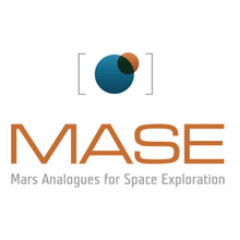MASE
Mars Analogues for Space Exploration (MASE)
- Start date
- 1 March, 2014
- End date
- 31 January, 2017
MASE is supported by European Community’s Seventh Framework Programme (FP7/2007-2013) under Grant Agreement n° 607297, coordinated by the European Science Foundation
Assessing the habitability of Mars and detecting life, if it was ever there, depends on knowledge of whether the combined environmental stresses experienced on Mars are compatible with life and whether a record of that life could ever be detected. However, our current ability to make these assessments is hampered by a lack of knowledge of how the combined effect of different environmental stresses influence the survival and growth of organisms. In particular, many combinations of stress, such as high radiation conditions combined with high salt and low temperature, relevant for early Mars, have not been investigated.
Furthermore, a lack of experimental studies on how anaerobic microorganisms respond to such stresses undermine our knowledge of Mars as a location for life since the planet is essentially anoxic. Even if life can be shown to be potentially supported on Mars, there exist no systematic studies of how organisms would be preserved. MASE proposes to address these limitations in our knowledge and advance our ability to assess the habitability of Mars and detect life.
Read more about the project here.
MASE proposes to address these limitations in our knowledge and advance our ability to assess the habitability of Mars and detect life. In particular, MASE intends to:
- Isolate and characterise anaerobic microorganisms from selected sites that closely match environmental conditions that might have been habitable on early Mars.
- Study their responses to realistic combined environmental stresses that might have been experienced in habitable environments on Mars.
- Investigate their potential for fossilisation on Mars and their detectability by carrying out a systematic study of the detectability of artificially fossilised organisms exposed to known stresses.
MASE will also consider thoroughly the following cross cutting aspects i) optimised methodologies for sample management and experimental process and ii) optimised methodologies for life detection.
MASE will allow to gain knowledge on Mars habitability and on adaptation of life to extremes, it will also present opportunities to optimise mission operations and life detection.
